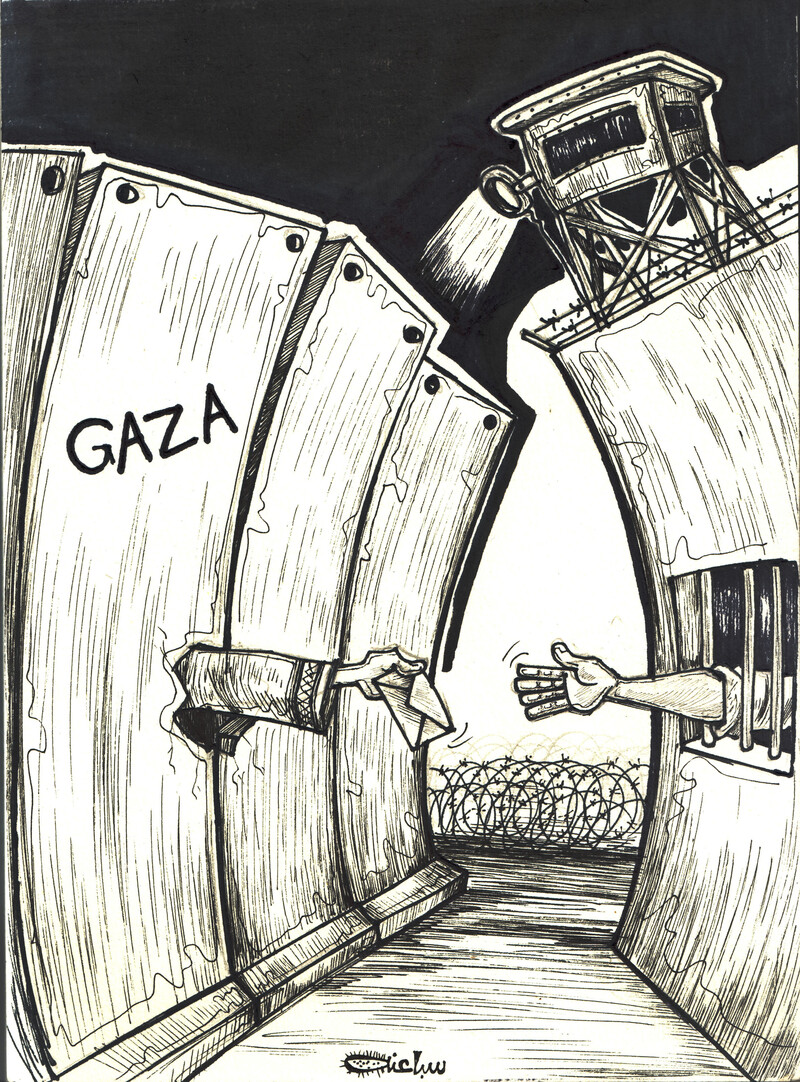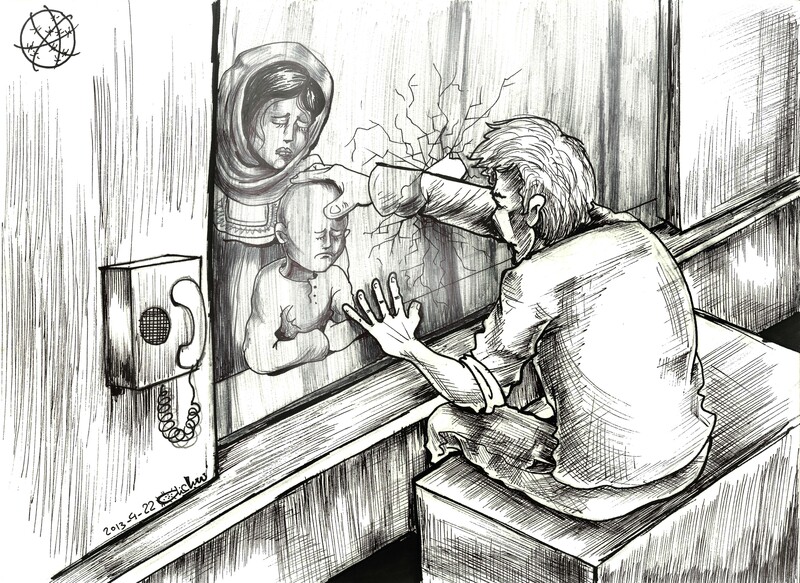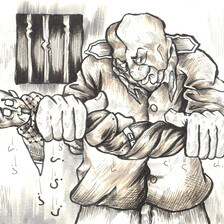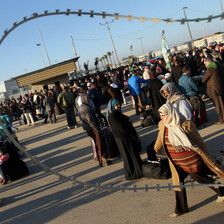The Electronic Intifada Gaza City 19 December 2014

Artwork by Mohammad Saba’aneh for The Electronic Intifada
Jehad Saftawi has not seen his father in more than nine years. After being denied entry permits to present-day Israel multiple times, the 23-year-old Gaza City-based journalist eventually stopped bothering to apply for prison visits through the International Committee of the Red Cross.
Because his 52-year-old father Emad was imprisoned while Jehad, the oldest of five siblings, was just nine years old, his mother “more or less had to raise us alone. It was very difficult because all of her relatives live in Syria,” Jehad told The Electronic Intifada.
Countless Palestinian families have faced such difficulty.
There were an estimated 6,500 Palestinian prisoners in Israeli detention as of 1 October, according to Addameer, a Ramallah-based group that monitors Israel’s arrests of Palestinians.
At least 381 of the prisoners were from the Gaza Strip.
Though Israel’s restrictive policies translate into hardship for all Palestinian political prisoners, those from Gaza have faced a number of unique hardships, particularly in recent years.
Gavan Kelly, advocacy officer for Addameer, explained that Palestinians in Gaza were banned from visiting relatives in Israeli prison during the 51-day military offensive against the Strip this summer.
The “denial of family visits has been used as a form of collective punishment” for Palestinians in Gaza, Kelly told The Electronic Intifada. He added that since 20 October, “visits have resumed, but are only taking place every two months as opposed to every two weeks as required under international law.”
On 8 December, 21 relatives of prisoners were granted entry to present-day Israel via the Erez crossing in northern Gaza, the Ma’an News Agency reported.
“Hardest years”
Jehad Saftawi said the last nine years have been the hardest of his life. His father, who was arrested in 2000, is always on his mind.
Along with his mother, two brothers and two sisters, he was on a family vacation in Amman, Jordan, shortly before his father’s arrest. “My dad was an employee working with the Palestinian Authority at the time,” he recalled. “He was in Dubai for his job and was supposed to return to Gaza two days after us.”
“We made it back to Gaza and waited for him. My mom got a call from the Israeli military saying that my father had been arrested while crossing Rafah,” he added, referring to the border post between Gaza and Egypt.
“My mother started to scream and cry a lot,” he said. “She was pregnant with my youngest sister at the time and knew that it would be bad.”
For Jehad’s mother, it brought back memories of a difficult past. Israel imprisoned her husband in 1992, during the first intifada — a popular uprising that spanned from 1987 to 1993 — for charges related to his activism with the Palestinian political organization Fatah.
But it was not long before Emad escaped from detention along with five fellow prisoners. Jehad said four of the prisoners who took part in that jailbreak were shot and killed by Israeli soldiers.
The surviving prisoners escaped to the Sinai desert region of Egypt, where Emad was imprisoned for several months before negotations between Fatah and the Egyptian government secured his release. But he remained in Egypt and was only able to return to Gaza in 1994 when the Palestinian Authority was established.
Upon returning to Gaza, Emad abandoned his ties with Fatah and became a supporter of Islamic Jihad, a Palestinian political group banned by Israel.
“He worked for the Palestinian Authority, and he was only a religious and political supporter of Islamic Jihad,” Jehad noted. “He was never involved in any armed attacks or political acts. He used to speak at local mosques, but that was it.”
He described his father’s arrest as “routine for the Israelis. He wasn’t a threat at all, and he had passed through Rafah crossing dozens of times for work without ever being stopped or interrogated.”
Denied right to see daughter
After being rearrested in 2000, his father was placed in administrative detention, a practice in which Israel locks away Palestinians for renewable periods of up to six months on the basis of “secret evidence” without charge or trial.
Though his charges from the first intifada were supposed to be nullified after the signing of the 1993 Oslo accords between Israel and the Palestine Liberation Organization, they were reinstated and he was handed an eighteen-year sentence by an Israeli military court.

Artwork by Mohammad Saba’aneh done while the cartoonist was imprisoned by Israel last year.
For most of the first two years, Israeli prison authorities held Emad in solitary confinement.
“Because she was born after he went back to prison, my father didn’t see my sister until she was three years old,” Jehad said. “The first time she saw our dad was when we were on a visit to the prison and she saw him through a glass window.”
“He stuck his finger through a hole in the glass window and my sister grabbed it with her tiny hand — it was the first time she ever touched our dad,” he added. “I started crying — I was still only twelve years old.”
Shot in prison
“It was very hard on us kids,” Jehad said. “We had to support our mother and we always missed our father. During holidays, it was especially hard. My mother would always cry … and we would go to visit family and were the only ones without our father.”
Their father’s absence was made more difficult by the treatment he has endured in Israeli detention.
During a prison visit ten years ago, Jehad learned that an Israeli guard had shot his father in the head and the back with a rubber-coated steel bullet. “It was very bad, and he had to get around thirty stitches in his head for that,” Jehad said.
According to the Israeli human rights group B’Tselem, violence and torture is part and parcel of Israel’s arrest and detention of Palestinians.
In a 2010 report based on testimonies provided by 121 Palestinian prisoners, the group found that Israeli “security forces used physical violence toward the detainee during arrest or en route to the detention facility” in 30 percent of the cases.
“Thirty-six percent of the detainees reported that interrogators cursed and verbally abused them,” the report adds, and “56 percent reported they were threatened by interrogators, including threats of violence.”
According to Addameer’s Gavan Kelly, the Israeli prison authorities use a vast array of tactics to “punish” Palestinian prisoners, particularly those from Gaza.
“These punishments include such things as attacks from Israeli special forces,” Kelly said, as well as “reduced recreational time, limited access to newspapers and TV channels, solitary confinement and limits on what can be purchased” in prison.
“Many of his friends were killed”
It was not until 2009 that Jehad’s mother was first granted permission to visit her husband in prison, and has since been allowed to visit him only a handful of times.
At least two hundred Palestinians were detained in Gaza during Israel’s summer attack. According to Israel’s Unlawful Combatants Law, its military can detain any “person who has participated either directly or indirectly in hostile acts against the State of Israel or is a member of a force perpetrating hostile acts against the State of Israel.”
Kelly, however, pointed out that the broad powers granted by the law allow Israel to “arrest anyone from Gaza and imprison them for indefinite periods of time based on completely secret evidence.”
Of the 24 prisoners detained during the most recent attack on Gaza and still held by Israel, Addameer is aware of at least one detainee who is being held under that law.
After recently visiting a group of those prisoners in Asheklon, a city in the south of present-day Israel, lawyers from the Gaza-based Palestinian Centre for Human Rights concluded that at least four of them have been subjected to torture.
The prisoners had undergone beatings or had been shackled between two chairs for long hours, Ma’an News Agency reported.
Meanwhile, back in his Gaza City apartment, Jehad Saftawi continues to worry about his father.
“Can you imagine seeing your father after he was locked away for eighteen years?” he asked. “I don’t know anything about him anymore. And what will he think of me?”
“We’ve all changed due to Israel’s three wars on Gaza and the siege,” he explained, shaking his head as he spoke about the destruction inflicted on the Strip this year.
“What will he think when he sees that all of these towers, buildings and homes have been destroyed? He will find out how many of his friends and relatives were killed or maimed during the wars.”
Patrick O. Strickland is an independent journalist and regular contributor to The Electronic Intifada. Find his reportage at www.postrickland.com. Follow him on Twitter: @P_Strickland_.





